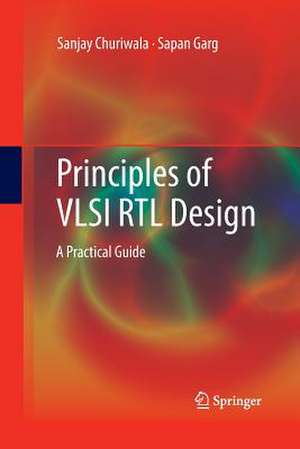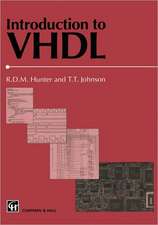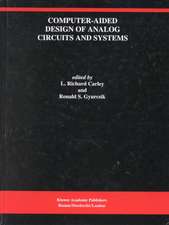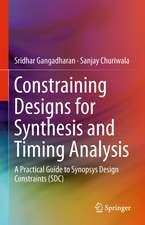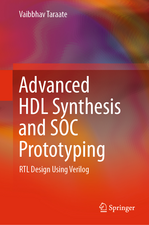Principles of VLSI RTL Design: A Practical Guide
Autor Sanjay Churiwala, Sapan Gargen Limba Engleză Paperback – oct 2014
| Toate formatele și edițiile | Preț | Express |
|---|---|---|
| Paperback (1) | 493.06 lei 38-44 zile | |
| Springer – oct 2014 | 493.06 lei 38-44 zile | |
| Hardback (1) | 781.62 lei 6-8 săpt. | |
| Springer – 12 mai 2011 | 781.62 lei 6-8 săpt. |
Preț: 493.06 lei
Preț vechi: 608.72 lei
-19% Nou
Puncte Express: 740
Preț estimativ în valută:
94.36€ • 97.48$ • 78.53£
94.36€ • 97.48$ • 78.53£
Carte tipărită la comandă
Livrare economică 21-27 martie
Preluare comenzi: 021 569.72.76
Specificații
ISBN-13: 9781489995452
ISBN-10: 1489995455
Pagini: 200
Ilustrații: XV, 182 p.
Dimensiuni: 155 x 235 x 11 mm
Greutate: 0.29 kg
Ediția:2011
Editura: Springer
Colecția Springer
Locul publicării:New York, NY, United States
ISBN-10: 1489995455
Pagini: 200
Ilustrații: XV, 182 p.
Dimensiuni: 155 x 235 x 11 mm
Greutate: 0.29 kg
Ediția:2011
Editura: Springer
Colecția Springer
Locul publicării:New York, NY, United States
Public țintă
ResearchCuprins
Introduction to RTL Designs; Ensuring RTL Intent; Static Timing Analysis (STA); Clock Domain Crossing (CDC); Power; Design for Test; Timing Exceptions; Congestion; Conclusions.
Textul de pe ultima copertă
�
In the process of integrated circuit design, front-end activities start with a register transfer level (RTL) description, of the functionality desired from the IC.� During subsequent steps in the design flow, issues may arise related to testability, data synchronization across clock domains, synthesizability, power consumption, routability, etc. which are a function of the way the RTL was originally written.
As a result, RTL designers need to take care of many aspects which can have impact on later steps in the design process. Since RTL design is less about being a bright engineer, and more about knowing the downstream implications of your work, this book explains those various aspects, their significance, what caution needs to be taken during RTL design and why.� Readers will benefit from a highly practical approach to the fundamentals of uncertainties around functionality, clock domain crossing and clock synchronization, design for test and testability, power consumption, static timing analysis, timing exception handling, and routing congestion.
Hopefully, this book will find its place in the hearts and minds of anyone who
generates RTL code. This includes RTL designers as well as those writing tools
that generate RTL. Relatively new RTL designers will find this book to be a single-source of interesting, rich and useful knowledge.� Experienced RTL designers will be able to appreciate and cement some already known concepts, given the focus on practical situations encountered in real designs.
�
* Provides a highly accessible, single-source reference to all key topics essential to an RTL designer;
* Describes in detail specific actions/cautions that designer needs to consider in design to avoid problems in downstream implementation;
* Covers content based on practical experience with numerous real designs from large semiconductor design companies.
�
�
Caracteristici
Provides a highly accessible, single-source reference to all key topics essential to an RTL designer; Describes in detail specific actions/cautions that designer needs to consider in design to avoid problems in downstream implementation; Covers content based on practical experience with numerous real designs from large semiconductor design companies. Includes supplementary material: sn.pub/extras
